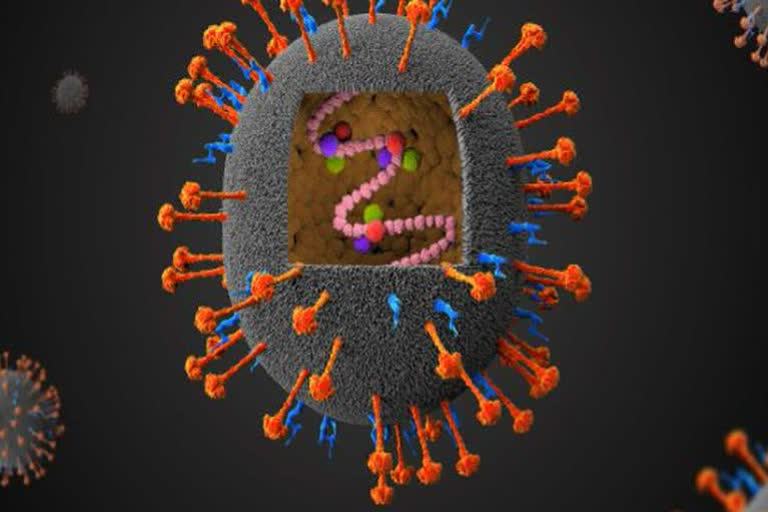Thiruvananthapuram: First Nipah virus infection in Kerala was reported at Kozhikode in the year 2018. It resurfaced again in 2019 at Kochi and on September 5, this year, another case has been reported at Kozhikode. In these three instances, 22 persons have died of Nipah in Kerala so far and in none of the cases, could the true source of infection be ascertained.
Muhammed Sabith of Perambra, Kozhikode was the first victim of the disease in 2018. Then those who came in contact with Sabith got infected. It was perceived that the fruit eating bats were the carriers of the virus and believed to be the source of the infection.
A detailed examination of bats in the region was carried out and the presence of the virus was found in these bat samples. However, it could not be ascertained whether the virus from bats infected the humans or not.
The main stumbling block in confirming the source of infection was that the first victim died before the disease could be diagnosed. All the other victims were contacts of Sabith.
The studies are still on to identify the original source of human infection and health experts had already warned about the possibility of repeated infections in Kerala.
Also read: Kerala authorities intensify efforts to trace origin of Nipah virus
Nipah is dangerous
The fresh case of Nipah has posed a real challenge to the Kerala health department as it is trying its best to combat the Covid-19 infection. Nipah is considered a very dangerous virus that has a very high mortality rate.
Symptoms
The common symptoms of the virus are fever, headache and dizziness. Symptoms like cough, stomach ache, nausea, vomiting, tiredness and blurred vision are also seen in patients infected with Nipah, but these are very rare.
Incubation
Symptoms become evident within four to 14 days after the virus enters the human body. In some cases, the incubation period could be up to 21 days. The patient would slip into a coma within one or two days of showing the symptoms. The virus attacks the brain and lungs. The virus spreads from one person to another through droplet transmission only after the patient starts showing the symptoms.
Extreme caution needed
Nipah is highly transmissible. So extreme caution should be practised to prevent the disease from spreading. It is commonly perceived that the Nipah virus spreads from the fruit-eating bat varieties. So one should be cautious about the presence of bats in their region and should avoid eating fruits that are bitten by the bats. Toddy is a favourite food of such bats and one should be wary of drinking toddy from open toddy pots kept on the trees. Similarly, plantain nectar is a favourite food of bats and one should stay away from consuming plantain nectar.
Also read: Central team visits Nipah victim's house and surroundings in Kerala
Fruits and vegetables should be washed properly before consumption. Meat should be cooked thoroughly as Nipah also infects animals. Those who take care of patients should also be very careful and should not come in contact with the bodily fluids of the patients.
Wearing a mask, maintaining social distance, and hand hygiene is very important. Minimum one-metre distance should be maintained from the patient. Materials used by the patient should be disinfected and kept separately.
Nipah disease tests
The presence of the Nipah virus is confirmed through an RT PCR test. Swabs taken from the throat and nose or spinal fluid samples are used for the tests. The 'Elisa test' is also being used to detect antibodies in the blood against the virus. The tests are being carried out at the virology labs in Pune and Manipal as there are presently no facilities available in Kerala to do the tests.
Follow the government protocol to prevent the spread
The health department has released a well-defined treatment and prevention protocol against Nipah, and the people should religiously follow these directions.
Nipah could also spread from the dead body of the infected. So guidelines should be strictly followed while cremating the body. Those who handle the dead body should wear a PPE kit and should ensure not to come in contact with the body fluids of the deceased. Final kisses and touching the dead body are strictly banned.
Also read: Two health workers show symptoms of Nipah virus infection; Kerala Health minister
The number of persons attending the funeral should be reduced to the minimum. All those attending the funeral should bathe using bath soaps.
Kerala health department believes that since the wearing of mask and maintenance of social distancing is being practised by all due to Covid, the chances of a spread has come down to minimal. At present 8 persons with symptoms are under close observation in Kozhikode. A contact list of 251 persons has been prepared. Out of which 32 persons are in the high-risk category. Kerala's experience in successfully handling the Nipah infection in 2018 and 2019 would come in handy to effectively manage the outbreak this year as well.



